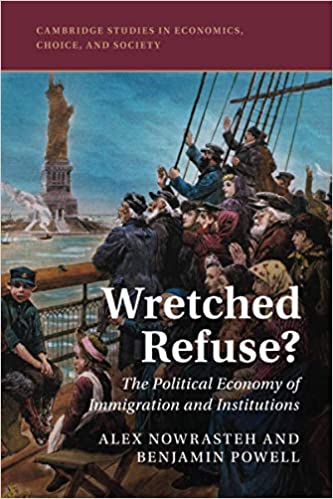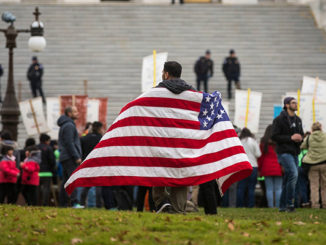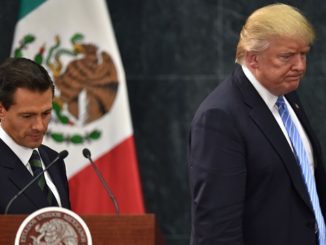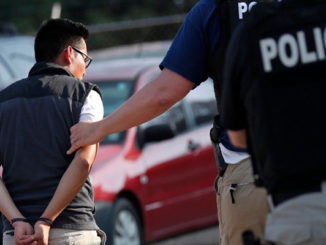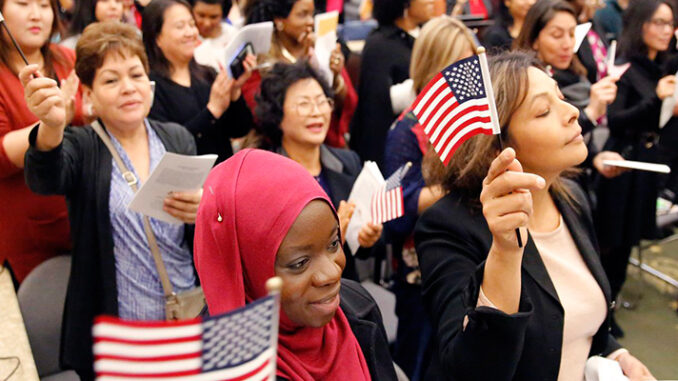
Economic arguments favoring increased immigration restrictions suggest that immigrants undermine the culture, institutions, and productivity of destination countries. But is this actually true?
by Alex Nowrasteh
Benjamin Powell and I wrote our book Wretched Refuse? The Political Economy of Immigration and Institutions to address the argument that liberalized immigration will undermine the very American institutions that created economic prosperity that attracted immigrants here in the first place. Immigrants generally come from countries with political, cultural, and economic institutions that are less conducive to economic growth than those in the developed world. The fear is that they’d bring those anti‐growth institutions with them. Thus, as their argument goes, the estimated enormous economic gains from liberalized immigrants are a deadly mirage and immigrants could actually kill the goose that lays the golden eggs. As we assiduously document, immigrants do not bring those institutions with them and there is even evidence that immigrants improve institutions after they immigrate.
It’s ironic that the immigration restrictionists most worried about immigrants degrading American institutions are attacking those very institutions at every level. After President Trump lost his reelection bid, the most nativistic members of his party have embarked on a quest to reverse the election. A dozen Republican Senators, mostly those supportive of cutting legal immigration, plan to object to the certification of Biden’s win over Trump. Over 100 representatives could join in too. President Trump cut legal immigration more than any other president and he recently threatened Georgia election officials.
Immigration restrictionists have also attacked the institution of private property. The Trump administration has seized or is trying to seize 5,275 acres of privately owned land to build a border wall, most of it in Texas. Trump even diverted Congressionally appropriated funds from the military to build the border wall. Customs and Border Protection even took Congressionally appropriated funds intended to help asylum seekers and spent it on other items like dirt bikes in violation of the law. Florida saddled businesses and employees with an E‐Verify regulatory mandate that further erodes the freedom to contract.
Immigration restrictionists have also attacked some important components of our culture, such as respect for honesty. They’ve lied about the family member of a Georgia election official to undermine cast doubt on his handling of the election. Many in Trump’s orbit are also conspiracy theorists or work with them at every opportunity. Making up stories to tarnish your opponents and believing in nutty conspiracy theories both break down trust in institutions, which is exactly what some nativists claim immigration does to the United States.
Some immigration restrictionists have also called for massive infringements on our civil liberties to keep President Trump in office. Retired General Michael Flynn even called for the president to declare martial law and for the U.S. military to re‐run the 2020 election, which alarmed Army officials enough to prompt them to declare that the military will not do that. They want to curb immigrant civil liberties, especially those of free speech, in order to preserve our institutions … except for free speech.
Many people are worried that immigrants will undermine American political and economic institutions. Our new book argues that they do not undermine economic and political institutions and that, even in some cases, they build them up. But immigration restrictionists continue to insist that immigrants represent a fundamental threat to our political and economic institutions. Like the babysitter in the famous urban legend, we just realized that the call is coming from inside the country. Immigrants are not the threat to our institutions, immigration restrictionists are.
Alex Nowrasteh is the director of immigration studies at the Cato Institute’s Center for Global Liberty and Prosperity.

